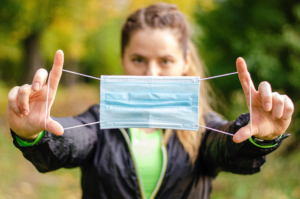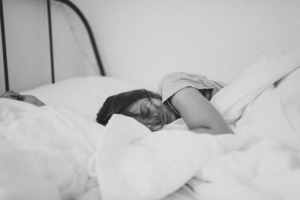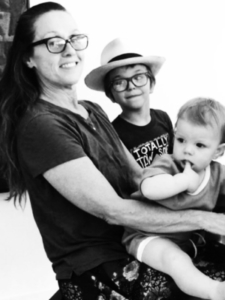The Opposite of Silver Linings: The Big Comeback

My doctor reached out to shake my hand this week during a checkup, and I recoiled in horror. He laughed. “It’s okay,” he said. “We’re all vaccinated, we’re wearing masks, and here,” he offered me the hand sanitizer. We both squirted some into our palms and then shook hands. His hand was cool and his grip was strong. I had not held the hand of another human being outside of my familial bubble in fourteen months. The handshake felt like taking in a much needed breath of fresh air followed by the bliss of a long, languid exhale.
My sense of time, space, and propriety is entirely different after this past year. I don’t know how long it will take to get it back – to return to any sense of “normal.” I met up with a friend the next day. We hiked around the hills in our West Los Angeles neighborhood together several times a week this past year, distanced from one another, sweating and mumbling through our masks as we walked. We both had our second vaccine dose weeks ago, yet my impulse was to bump elbows with her. Mid bump, I decided to hug her. I squeezed her tight for several seconds in the middle of the street, struck by how strange and wonderful another body felt mashed up against my own.
As much as those tactile delights mean to me, there is a downside to the “comeback.” Before the pandemic, life was just going along. Sure, I had my usual episodic bouts of existential terror over nothing in particular, periodic nebulous dread of something “bad happening.” And then, BAM! Out of the blue, something really bad happened, something I never even thought to dread. Everything just stopped, or so it felt. But at least I had something real to be anxious about for a change. I stopped fixating on my vague fears of unspecified calamity. My floating anxiety gained purchase and safe harbor in real disasters and dangers! Before this loosening up of restrictions, I knew what to do to manage my fear: Buy toilet paper and dried beans. Double-mask. Give my groceries a good bleach rub down before bringing them inside. Settling into those obsessive habits soothed me and gave me a sense of control. Now, I am not so sure what to be anxious about, or what specifically to do about that anxiety.
The world is speeding up again, way too fast. All of a sudden the CDC advises that we can just toss our masks if we’re fully vaccinated. Really? Even though the vaccine does not give 100% immunity and, for every person who catches COVID, the virus gets another chance to mutate and break through the immunity the vaccines do provide? And we are to simply trust that other people who are not wearing masks have been vaccinated? It’s on the “honor system,” you say?
An article published mid-May in USA Today casts doubt on that. According to researchers, people are more likely to lie if there’s greater incentive and lower risk.
It’s “very, very likely people are going to lie (about being vaccinated) … because there’s no verification system and no punishment,” Kang Lee, a professor at the University of Toronto who studies honesty and deception, said in the article.
Michael Cunningham, a psychologist at the University of Louisville who has done 35 years of research on lying, cheating and stealing is also quoted, “Surveys indicate that more than a quarter of all Americans say they don’t want a COVID-19 vaccine. Imagine if about a quarter of that subgroup lies about their status to go unmasked.”
The article goes on to note that, according to Arthur Caplan, a bioethics professor at NYU School of medicine, he’s nervous that people will feel more justified in lying because the vaccine has been politicized. “It isn’t just the honor system. Many people don’t want the vaccine on ideological grounds,” Caplan said.
Lee agreed.
“My intuition is that given the situation, a lot of people feel they are justified not to take the vaccinations. Therefore, they are going to feel more justified to lie to you as well.”
This information isn’t surprising to anyone who pays attention to how people tick. What’s shocking is we are now being told to go against our instincts and trust that a public who has been significantly rebellious about public health edicts is suddenly going to fall in line.

To be honest, it’s not just my fear of the virus or loss of a concrete excuse to be neurotic that has me down about the big comeback. This year-long hunker-down reset my rhythms to a slower, less eventful pace. The pandemic gave me an excuse to do what I would rather do anyway. I am loath to give up sleeping until I feel ready to get out of bed. I don’t want to go back to traffic jams and parking tickets or obligatory events. Though I suppose that’s not entirely new. Even before the pandemic, my favorite tee-shirt graphic slogan was, “I’m sorry I’m late. I didn’t want to come.”
I am happy in sweatpants. I don’t miss zippers. Or shoes. Now people are going to expect me to groom myself, and even tend to my lengthening grey roots, which used to be proof that I was being socially responsible and adhering to the stay at home orders. My seven inches of un-dyed, graying hair, that was until a few weeks ago my virtue signal, has lost its cache.
Without a mask to hide behind, I will have to brush my teeth and put on sunscreen. I will lose my anonymity. I loved my anonymity. What am I going to do with the cartons of counterfeit N95 masks I bought in the early panic? If I never eat dinner in another crowded super noisy LA restaurant it will be too soon.
And, as we come back from over a year of hiding out and lying low, how do we determine the appropriate pace? How soon is too soon to admit to people that you have gone out to eat inside a restaurant, flown in an airplane, let repair people into your house, and stopped bleaching your groceries? When can you confess to having had your nails done or confide that you have allowed yourself to (gasp) run out of toilet paper?
I know how lucky I have been and how much harder this period has been for others. No one I know well has died of COVID. I have been able to afford to have groceries delivered. I didn’t lose my job. The pandemic has been tougher on some parts of the population than others – the hardships uneven. So many people have lost loved ones, most not even able to say a proper goodbye. There has been a staggering amount of suffering and multitudes of people have lost the ability to provide for their own basic needs.
The hard evidence of economic desperation hit home for me a few months ago, while I was biking along the Kern River in Bakersfield, California. The biking and walking trail ambles alongside the mostly dry riverbed for several miles. The river there is wide and filled with clusters of poplars, scrub oak, and bushy pepper trees. I lived in Bakersfield for over thirty years and it was widely known that there were homeless people who lived along the river, but we rarely saw them. Their scattered shelters and the random shopping cart was easily hidden, stashed behind flowering or thistled shrubs. But now, every copse has an encampment of some kind affixed to it. There are literally hundreds of people, mostly in groups or families, camped in the dust. Some have tents and generators, some only tarps and cardboard boxes to lie on. I saw a large family trudging across the dry dirt carrying bottled water and bags of groceries to a spot under some eucalyptus where their belongings had been set up. I was stunned by the amount of people living in the riverbed. So many people have lost their homes or apartments and their jobs; mostly those who could least afford to miss a paycheck. The Kern River bed has become a scene the likes of which has not existed in that area since the Dust Bowl ninety years ago.
I have seen tent cities in urban areas like Los Angeles, San Diego, and Seattle. I have never seen anything like this in Kern County. What will become of all these people? In more urban areas, although there are not nearly enough services for the unhoused, there are soup kitchens, and you can usually count on social workers and medical care vans to make the rounds. But not in the Kern River. And soon it will reach triple digit temperatures in Bakersfield and stay that way until mid-October.
Although the pandemic gave me some new perspectives and cover for my introverted tendencies, I’m so over considering its’ “silver linings.” Let’s face it; it’s been an epic shit show.
For some people like me, this last year has allowed us to discover a pace of life that suits us, and I for one hope to maintain that pace as much as possible. But, while there are some of us lucky or privileged enough to be embracing or resisting a “return to normal,” that is an impossible dream for many. They have lost too much and had too little to lose to begin with. I take some solace in that there has been, at least for me and hopefully for many others, a heightening of awareness of the inequity in our society, and I plan to act on that and do more to help ease the suffering of my fellow man and woman. In response to all that I have observed, I am becoming involved with the movement of support for the unhoused in Kern County, where it seems to me the need is so raw.
Something else comforts me as well; my hope that I am hearing the last of the terms I have come to despise, like: Silver Linings; Unprecedented; and Everything is going to be okay. Stop telling me to come back out into the world and feel better. Let me stay inside and be safe in my misery a little bit longer.
Karen Gaul Schulman is a writer and attorney who lives in Los Angeles, California. She left her family law practice of 30 years to pursue a life of letters and play with her grandchildren. She is currently an MFA candidate at Antioch University LA.





